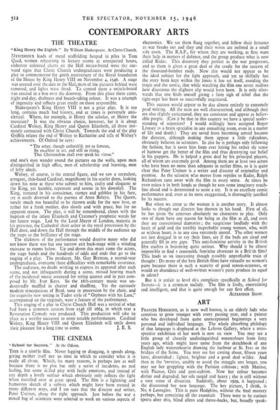THE CINEMA
" School for Secrets." At the Odeon.
THIS is a nimble film. Never lagging or dragging, it speeds along, giving neither itself nor us time in which to consider what it is really all about. Which, foi many reasons, is perhaps just as well because there is no plot but only a series of incidents, no real feeling, but some skilled play with facile emotions, and instead of any depth a lovely surface which obviously only reflects the light when travelled over at great speed. The film is a lightning and humorous sketch of a subject which might have been treated in many different ways, and I am sure that the director and writer, Peter Ustinov, chose the right approach. Just before the war a mixed bag of scientists were selected to work on various aspects of
electronics. We see them flung together, and follow their fortunes as war breaks out and they and their wives are isolated in a small safe town. The R.A.F., for whom they are working, at first want their help in matters of defence, and the group produce what is now called Radar. This discovery they perfect as the war progresses, and to them is given a great deal of the credit for the success of the thousand-bomber raids. Now this would not appear to be the ideal subject for the light approach, and yet so skilfully has the story been kept within the limits it has set itself, avoiding the tragic and the comic, that while watching the film one never realises how disastrous the slightest slip would have been. It is only after- wards that one finds oneself giving a faint sigh of relief that the tight-rope has been so successfully negotiated.
This success would appear to be due almost entirely to extremely good writing. All the men are well characterised, and although they are also slightly caricatured, they are consistent and appear as believ- able people. (Can it be that in this country we have a special under- standing of scientists? I would willingly have accepted Roger Livesey as a brain specialist in any consulting room, even in a matter of life and death.) They are saved from becoming unreal because the director, although making them appear a little ridiculous, obviously believes in scientists. In this he is perhaps only following the fashion, but it saves hint from ever letting his rather sly sense of humour get the better of the film and thus destroying our belief in his puppets. He is helped a great deal by his principal players, all of whom are extremely good. Among them are at least two actors who have been no more than adequate in earlier films, so it is quite clear that Peter Ustinov is a writer and director of originality and promise. As the scientist who moves from reptiles to Radar, Ralph Richardson runs away with the film in every sense. At times he even seizes it in both hands as though he sees some imaginary touch- line ahead and is determined to score a try. It is an excellent comic performance and, even at its most exaggerated, is thoroughly justified by its success.
But when we come to the women it is another story. It almost looks as though our director has thrown in his hand. First of all, he has given the actresses absolutely no characters to play. Only two of them have any reason for being in the film at all, and even they are conventional dummies ; the suspicious landlady with the heart of gold and the terribly improbable young woman, who, with or without heart, is in any case extremely unreal. The other women are just dragged in to say their lines, see if the beds are aired and generally fill in any gaps. This anti-feminine activity in the British film studios is becoming quite serious. Why should it be almost impossible to find a reasonable feminine character in a British film? This leads to an interesting though possibly unprofitable train of thought : Do many of the best British films have virtually no women's parts because there is such a scarcity of good screen-actresses, or would an abundance of well-written women's parts produce its equal in talent?
But it is unfair to level this complaint specifically at School for Secrets—it is a common malady. The film is lively, entertaining and intelligent, and that is quite enough for any first effort. ALEXANDER SI-lAW.


































 Previous page
Previous page